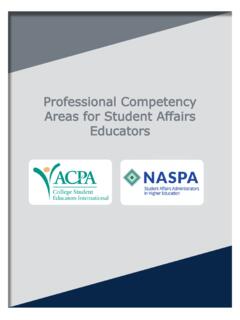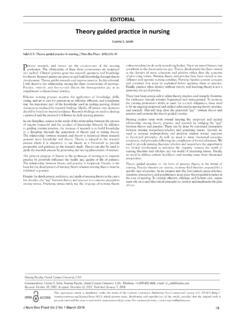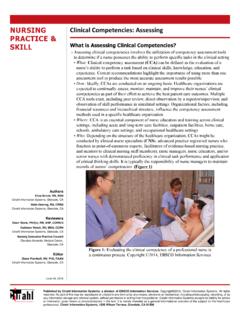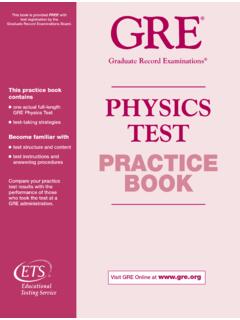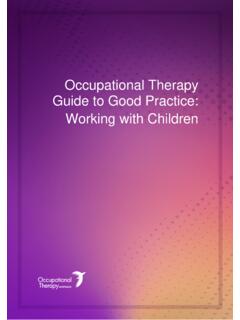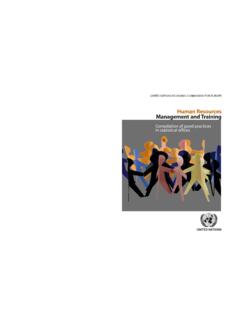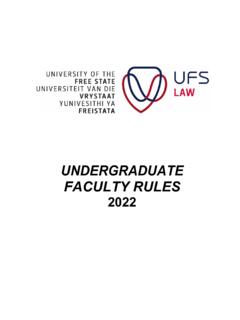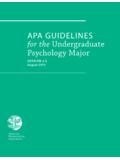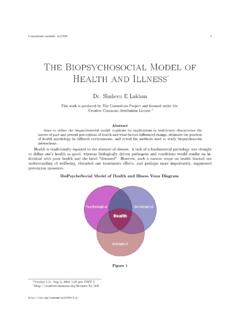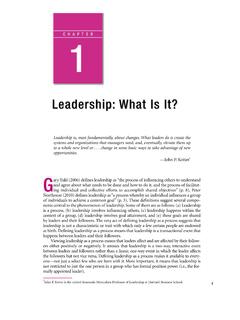Transcription of Principles of Good Practice for Student Affairs
1 Principles of good Practice for Student Affairs good Practice in Student Affairs : Engages students in active learning. Helps students develop coherent values and ethical standards. Sets and communicates high expectations for Student learning. Uses systematic inquiry to improve Student and institutional performance. Uses resources effectively to achieve institutional missions and goals. Forges educational partnerships that advance Student learning. Builds supportive and inclusive communities. IntroductionToday s context for higher education presents Student Affairs with many challenges. Among these are new technologies, changing Student demographics, demands for greater accountability, concern about the increasing cost of higher education, and criticism of the moral and ethical climate on campuses. Institutions of higher learning are also influenced by social and political issues, including multiculturalism, personal responsibility, and equal opportunity.
2 Our response to these challenges will shape our role in higher education. The choice of Student Affairs educators is simple: We can pursue a course that engages us in the central mission of our institutions or retreat to the margins in the hope that we will avoid the inconvenience of in higher education have recognized these challenges and have responded with calls to concentrate on the core function of the enterprise, that is, focusing on Student learning (Wingspread Group, 1993). Focusing on learning rather than instruction is a fundamental shift in perspective. If the purpose of education is learning, then institutional effectiveness should be measured by specific educational benefits and outcomes rather than by the number of computers, books, faculty, or the size of learning environments and learning experiences for students has always been at the heart of Student Affairs work.
3 The Student Learning Imperative (American College Personnel Association, 1994) asked us to embrace the current challenges as an opportunity to affirm our commitment to Student learning and development. As a first step in that direction, the Student Learning Imperative articulated the need for an emphasis on Student learning and the value of Student Affairs educators working collaboratively with students , faculty, academic administrators, and others. The next step is identifying practices that will move our profession forward in its focus on learning and guide us in meeting the challenges with which we are confronted. For this purpose, we have identified Principles to guide the daily Practice of Student Affairs Principles of good Practice for Student AffairsIn 1986 in the wake of reports critical of undergraduate education, the Lilly Endowment and the Johnson Foundation sponsored an effort by higher education leaders to identify the most effective approaches to educating undergraduates.
4 From this discussion, Chickering and Gamson (1987) developed seven Principles of good Practice in undergraduate education: (1) Student -faculty contact, (2) cooperation among students , (3) active learning, (4) prompt feedback, (5) time on task, (6) high expectations, and (7) respect for diverse talents and ways of learning. These Principles established a concise statement of behaviors associated with high quality undergraduate education that practitioners, scholars, and the general public could understand and Affairs lacks a comparable statement of good Practice . If we are to collaborate with others in higher education to advance Student learning, we need clear and concise guidelines for how to proceed. This document -- Principles of good Practice for Student Affairs -- is intended to provide those guidelines.
5 Some of the Principles identified for good Student Affairs Practice are similar to those proposed by Chickering and Gamson (1987). The two sets of Principles share a commitment to Student learning, but the primary audiences for each document and the scope of learning activities addressed are of Student Affairs Practice Student Affairs Commitments and ValuesTo be meaningful, Principles of good Practice for Student Affairs should be consistent with our core values which have been documented throughout the literature of the profession. Since 1937 when the American Council on Education published the first Student Personnel Point of View, our field has produced many documents about Student Affairs work. These works span seven decades, examining Student Affairs from different perspectives and for different purposes.
6 They demonstrate our long-standing belief that higher education has a responsibility to develop citizens capable of contributing to the betterment of society. These documents affirm our conviction that higher education has a duty to help students reach their full beliefs about higher education serve as the foundation for our commitment to the development of the whole person ; our collective professional values are derived from that commitment. Values evident across the history of Student Affairs work include an acceptance and appreciation of individual differences; lifelong learning; education for effective citizenship; Student responsibility; ongoing assessment of learning and performance ( students and our own); pluralism and multiculturalism; ethical and reflective Student Affairs Practice ; supporting and meeting the needs of students as individuals and in groups; and freedom of expression with civility.
7 Any statement of Principles of good Practice for Student Affairs must be consistent with our profession s values and must help us meet our founding Importance of ContextOur history also reminds us that good Student Affairs Practice must be considered within the context of issues that influence higher education and its missions. Societal concerns and needs, economic conditions, and external political agendas shape the parameters for Student Affairs work. These conditions emphasize the need for our practices to be informed by research and writing not only about teaching and learning but also concerning the most pressing issues confronting our students and their contexts influence how Principles for good Practice are applied. Such contexts within higher education include institutional missions, expectations, and Student demographics.
8 In realizing institutional goals, each Student Affairs division is responsible for managing its resources effectively in support of its institution s mission. This document provides a framework to aid Student Affairs in meeting these challenges without sacrificing the individuality of their the PrinciplesThe Principles of good Practice are not immutable rules, nor do we offer specific instructions for their use at particular institutions. The Principles are means to conducting learning-oriented Student Affairs work, based on extensive research about the impact of college on educational outcomes. As such, they offer unambiguous, yet adaptable, guidelines for productive use of resources for Principles were written to be incorporated into everyday tasks and interactions with students , faculty, academic administrators, and others.
9 They are intended to shape how we think about our responsibilities, communicate our purposes to others, and engage students . Using the Principles as a one-time topic for staff orientation or setting them aside until a crisis occurs for which they might be useful serves little purpose. Rather, the Principles should create a continual context for examining and implementing Student Affairs missions, policies, and programs. They should provide both a guide for assessing the contribution of Student Affairs to Student learning outcomes and a curriculum for ongoing in-service of good Practice1. good Practice in Student Affairs engages students in active learning. (See Inventory 1.)Active learning invites students to bring their life experiences into the learning process, reflect on their own and others perspectives as they expand their viewpoints, and apply new understandings to their own lives.
10 good Student Affairs Practice provides students with opportunities for experimentation through programs focused on engaging students in various learning experiences. These opportunities include experiential learning such as Student government; collective decision making on educational issues; field-based learning such as internships; peer instruction; and structured group experiences such as community service, international study, and resident advising. 2. good Practice in Student Affairs helps students develop coherent values and ethical standards.(See Inventory 2.) good Student Affairs Practice provides opportunities for students , faculty, staff, and Student Affairs educators to demonstrate the values that define a learning community. Effective learning communities are committed to justice, honesty, equality, civility, freedom, dignity, and responsible citizenship.




